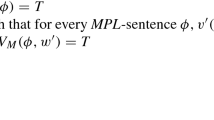Abstract
The problem with model-theoretic modal semantics is that it provides only the formal beginnings of an account of the semantics of modal languages. In the case of non-modal language, we bridge the gap between semantics and mere model theory, by claiming that a sentence is true just in case it is true in an intended model. Truth in a model is given by the model theory, and an intended model is a model which has as domain the actual objects of discourse, and which relates these objects in an appropriate manner. However, the same strategy applied to the modal case seems to require an intended modal model whose domain includes mere possibilia.
Building on recent work by Christopher Menzel (Nous 1990), I give an account of model-theoretic semantics for modal languages which does not require mere possibilia or intensional entities of any kind. Menzel has offered a representational account of model-theoretic modal semantics that accords with actualist scruples, since it does not require possibilia. However, Menzel's view is in the company of other actualists who seek to eliminate possible worlds, but whose accounts tolerate other sorts of abstract, intensional entities, such as possible states of affairs. Menzel's account crucially depends on the existence of properties and relations in intension.
I offer a purely extensional, representational account and prove that it does all the work that Menzel's account does. The result of this endeavor is an account of model-theoretic semantics for modal languages requiring nothing but pure sets and the actual objects of discourse. Since ontologically beyond what is prima facie presupposed by the model theory itself. Thus, the result is truly an ontology-free model-theoretic semantics for modal languages. That is to say, getting genuine modal semantics out of the model theory is ontologically cost-free. Since my extensional account is demonstrably no less adeguate, and yet is at the same time more ontologically frugal, it is certainly to be preferred.
Similar content being viewed by others
References
Adams, Robert Merrihew. “Theories of Actuality”. In The Possible and the Actual. Ed. M. Loux. Ithaca: Cornell University Press, 1979: 190–209.
Etchemendy, John. The Concept of Logical Consequence. Cambridge: Harvard University Press, 1990.
Gupta, Anil. “Modal Logic and Truth”. J. Philos. Log. 7 (1978): 441–472.
Menzel, Christopher. “Actualism, Ontological Commitment, and Possible Worlds Semantics”. Synthese 85 (1990): 355–389.
Peacocke, Christopher. “Necessity and Truth Theories”. J. Philos. Log. 7 (1978): 473–500.
Plantinga, Alvin. The Nature of Necessity. Oxford: Oxford University Press, 1974.
Tarski, Alfred. “Pojecie prawdy w jezykach nauk dedukacyjnych”. (1993). Translated as “On the Concept of Truth in Formalized Languages.” In Logic, Semantics, Metamathematics. 2nd edn Trans. J.H. Woodger. Indianapolis: Hackett Publishing. 1983, pp. 152–278.
Author information
Authors and Affiliations
Additional information
Special thanks to Brian Chellas, Charles Chihara, Harry Deutsch, Bernard Linsky, Kirk Ludwig, Christopher Menzel and Gila Sher for helpful discussion. My thanks also to an anonymous referee for this Journal for kind words and attention to detail. Portions of this paper were presented at the 1993 meeting of the Society for Exact Philosophy in Toronto, and at the 1994 conference of the Association for Symbolic Logic in Gainesville, Florida. Thanks to all who attended those sessions.
Rights and permissions
About this article
Cite this article
Ray, G. Ontology-free modal semantics. J Philos Logic 25, 333–361 (1996). https://doi.org/10.1007/BF00249664
Issue Date:
DOI: https://doi.org/10.1007/BF00249664



